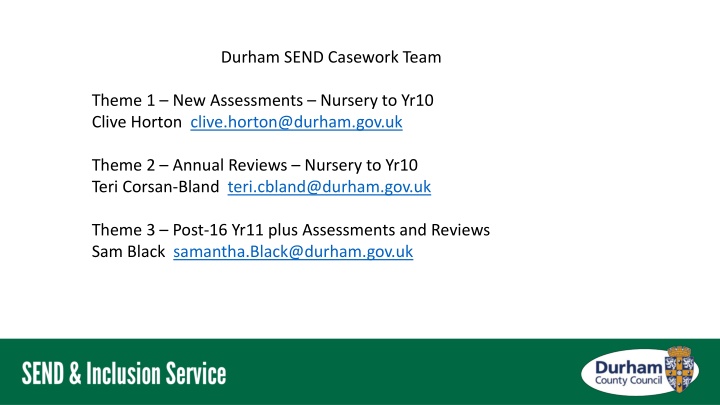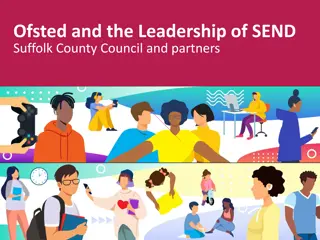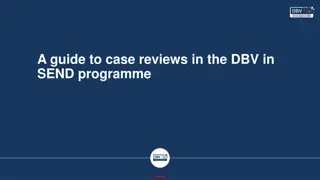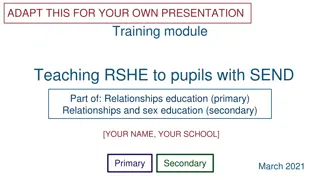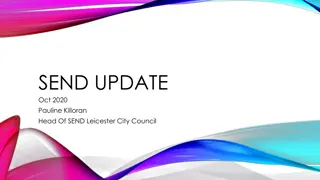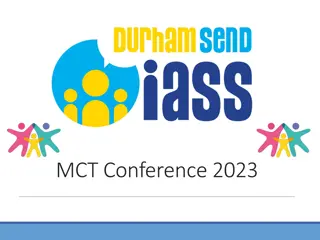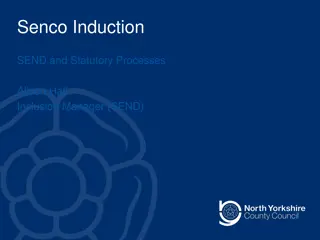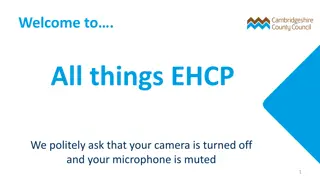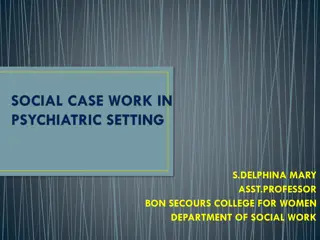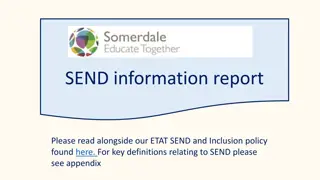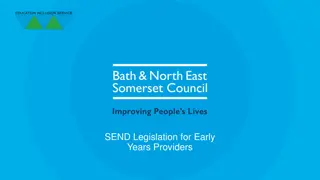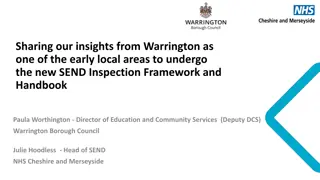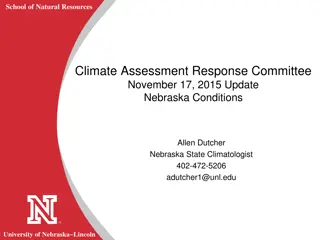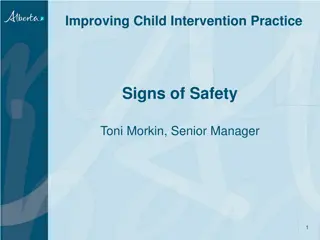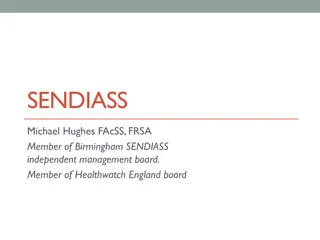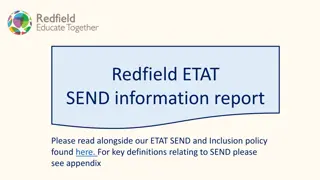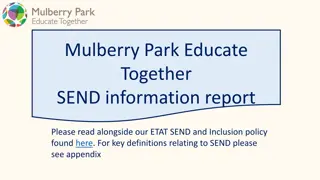Overview of SEND Casework Team and Assessment Trends
The Durham SEND Casework Team comprises dedicated individuals focusing on assessments and reviews for children from nursery to Year 11 and beyond. The team faces pressures related to funding banding and improving communication with parents. They oversee a significant increase in assessment requests, with a profile of assessments showing consistency yet growth. New funding processes, along with a graduated approach to learning, aim to meet children's individual needs effectively.
Download Presentation

Please find below an Image/Link to download the presentation.
The content on the website is provided AS IS for your information and personal use only. It may not be sold, licensed, or shared on other websites without obtaining consent from the author.If you encounter any issues during the download, it is possible that the publisher has removed the file from their server.
You are allowed to download the files provided on this website for personal or commercial use, subject to the condition that they are used lawfully. All files are the property of their respective owners.
The content on the website is provided AS IS for your information and personal use only. It may not be sold, licensed, or shared on other websites without obtaining consent from the author.
E N D
Presentation Transcript
Durham SEND Casework Team Theme 1 New Assessments Nursery to Yr10 Clive Horton clive.horton@durham.gov.uk Theme 2 Annual Reviews Nursery to Yr10 Teri Corsan-Bland teri.cbland@durham.gov.uk Theme 3 Post-16 Yr11 plus Assessments and Reviews Sam Black samantha.Black@durham.gov.uk
Current Pressures within the SEND Casework Team Overview of funding banding in mainstream schools Improving Communication with Parents/Carers Strengthening the decision making process
New Assessment Requests Profile of assessments remains consistently the same Requests for New Assessment 2018-19 to 2022-23 (Nov 22 to Aug 23 Estimate) 300 Spike in March Impact of guidance date 250 250 Total number of requests increasing 2018 -19 583 2019-20 544 2020-21 582 2021-22 855 2022-23 1114-Estimate 194 200 164 144 150 117 112 111 103 96 92 100 88 86 85 Requests KS1(inc R) around 24% KS2 around 46% KS3 around 23% KS4 around 7% 81 80 69 68 67 66 63 63 62 62 62 61 58 53 52 52 51 49 47 46 45 45 44 42 42 43 43 42 50 40 39 35 32 33 32 32 32 31 30 26 26 22 17 14 13 9 7 7 0 Sept Oct Nov Dec Jan Feb Mar Apr May Jun Jul Aug 34 new assessments in November 2022 18-19 19-20 20-21 21-22 22-23
New Funding Process - All New EHCP and SEN Support Top-Up Funding from September 2022 Band A Special Educational Provision from Core and Notional Budgets Schools are expected toprovide additional to and different from provision to meet identified SEND needs up to the value of 6,000 notional funding for each pupil. Band B1/2 Increased Support Band B1 - 1,000 Band B2 - 3,000 Band C1/C2 Frequent Support Band C1 - 5,000 Band C2 - 7,000 Band D1/D2 Frequent and Intensive Support Band D1 - 9,000 Band D2 - 11,000
The Graduated Approach to Learning Meeting all children's needs Independent Special Schools A legal document provided by the Local Authority that outlines the education, health and care needs of a child, how they can be supported, by whom Children most in need Education, Health and Care Needs EHCP Maintained/Academy Special School Enhanced Learning Provision The process to determine the education, health and social care needs of a child an how they can best be supported Statutory Assessment Mainstream School A formal plan outlining how children can be supported with expected outcomes SEN Support Plan Recognising the first signs of concerns that a child is not making expected progress/a record of how best to support Short Note SEN Statutory duty to meet the special educational needs of ALL children on roll Teachers catering for the individual needs of all children whom they have a responsibility Quality First Teaching All Children
Present Process Communication with Parents Key Points in Process Gathering of further evidence to determine how best to support needs of a child/young person SEND Panel Wk 0 Wk 6 Wk 16 Wk 20 Placement Commissioning MAM? School/ Parents Final EHCP completed/issued Request received Letter to parents Panel Outcome Letter to parents Possible discussions with professionals and parents to confirm needs and how they can best be met Decision Making Presently the decision is made by the Caseworker and Caseworker Manager Yes to an EHCP and Yes to Special School Currently a Multi-Agency Meeting (MAM) might form part of the decision making process Make up of the MAM has become limited to Parent/School/Caseworker
Proposed Process Improving Communication with Parents Strengthening Decision Making Wk0 Request Received Gathering of further evidence to determine how best to support needs of a child/young person Wk6 Wk16 Wk20 SEND Panel Placement Commissioning Local Authority Preference 1-Mainstream 2-Mainstream with additional support ELP 3-Maintained/Academy Special School 4-Independent Special Caseworker provides feedback on outcome of request End of Assessment Decision Panel Caseworker Allocated Contact with parent made Caseworker provides feedback on outcome of request School/Parent Focused meeting Where possible we would like a child s needs to be met in their nearest school to enable their continued links to their community EHCP Yes/No Special School Yes/No Funding Band
